Your Guide to What If Someone Gets Your Medicare Number
What You Get:
Free Guide
Free, helpful information about Medicare FAQ and related What If Someone Gets Your Medicare Number topics.
Helpful Information
Get clear and easy-to-understand details about What If Someone Gets Your Medicare Number topics and resources.
Personalized Offers
Answer a few optional questions to receive offers or information related to Medicare FAQ. The survey is optional and not required to access your free guide.
What Happens If Someone Steals Your Medicare Number?
Imagine enjoying a quiet afternoon when your phone rings, and the voice on the other end begins asking about Medicare services you never received. Alarm bells ring in your mind as it dawns on you: your Medicare number has been compromised. This scenario is daunting for anyone, but understanding the implications and how to protect yourself can bring clarity and peace of mind.
The Ripple Effects of Medicare Fraud
When someone gets a hold of your Medicare number, it opens the door to a range of fraudulent activities. Your personal Medicare information is essentially a key that, if obtained by the wrong hands, can lead to:
- Unauthorized Medical Services: Fraudsters may use your number to obtain medical services, leaving you with dubious entries in your medical records.
- Billing Fraud: Your Medicare account could be billed for services or equipment never received, possibly affecting your available benefits.
- Potential Identity Theft: While your Medicare number does not typically include your Social Security Number, its compromise can contribute to broader identity theft risks, especially if paired with other personal information.
Immediate Steps to Take
If you suspect your Medicare number has been compromised:
- Contact Medicare: Report your suspicions as soon as possible to the Medicare office by calling their fraud hotline.
- Document Everything: Keep a detailed record of all communications, including dates, names of those you spoke to, and advice given.
- Review Your Medicare Summary Notices (MSN): Regularly check your MSNs or electronic Explanation of Benefits (EOB) statements for unfamiliar charges or services.
- Alert Your Health Care Providers: Inform your regular providers about the potential fraud to prevent unauthorized access to your medical history.
Broader Security Measures
Beyond immediate actions, consider broadening your security net to guard against similar threats:
- Shred Personal Documents: Dispose of medical documents securely to prevent them from reaching the wrong hands.
- Secure Your Online Accounts: Use strong, unique passwords for all your accounts to prevent unauthorized access.
- Monitor Your Credit: Regular credit checks can reveal unauthorized inquiries or accounts, giving you early warning signs of identity theft.
Exploring Financial Safety Nets
If the impact of fraud extends into financial strains, exploring various assistance programs can provide crucial support:
- Government Aid Programs: Consider programs like Medicaid or state-specific assistance programs to cover gaps in service or prolonged issues.
- Debt Relief Options: If unauthorized use leads to financial burdens, debt relief solutions or credit counseling may provide viable paths to recovery.
- Identity Theft Protection Services: Investing in identity theft protection can offer peace of mind and resources in the event of identity-related issues.
Educational and Financial Resources Available
Finally, awareness and proactivity are your strongest allies. Educate yourself on available resources that can mitigate the consequences of such breaches and fortify your financial and educational circumstances:
- 📚 Educational Grants: Look into grants that can empower you through courses on fraud prevention or financial literacy.
- 💳 Credit Card Solutions: Research credit cards that offer enhanced fraud protection and monitoring features.
- 💼 Financial Assistance Programs: Available through government and non-profit organizations to support those impacted by fraud or unexpected financial challenges.
Your Medicare number is a gateway to your personal health services, and its safety is paramount. By understanding the risks and being aware of supportive resources, you not only protect yourself against immediate harm but also strengthen your resilience against future threats.
What You Get:
Free Medicare FAQ Guide
Free, helpful information about What If Someone Gets Your Medicare Number and related resources.

Helpful Information
Get clear, easy-to-understand details about What If Someone Gets Your Medicare Number topics.

Optional Personalized Offers
Answer a few optional questions to see offers or information related to Medicare FAQ. Participation is not required to get your free guide.


Discover More
- a Medical Provider That Accepts Medicare Assignment Must
- a Medical Provider That Accepts Medicare Assignment Must Quizlet
- a Medicare Patient Received Treatment That Isn't Covered By Medicare
- a Medicare Patient Receives Treatment That Isn't Covered By Medicare
- a Medicare Supplement Basic Benefit Is Quizlet
- a Medicare Supplement Companies
- a Medicare Supplement Policy Is Quizlet
- a Medicare Supplement Policy Must Not Contain Benefits Which
- a Patient Received Treatment In August Medicare
- Am I Eligible For Medicare
